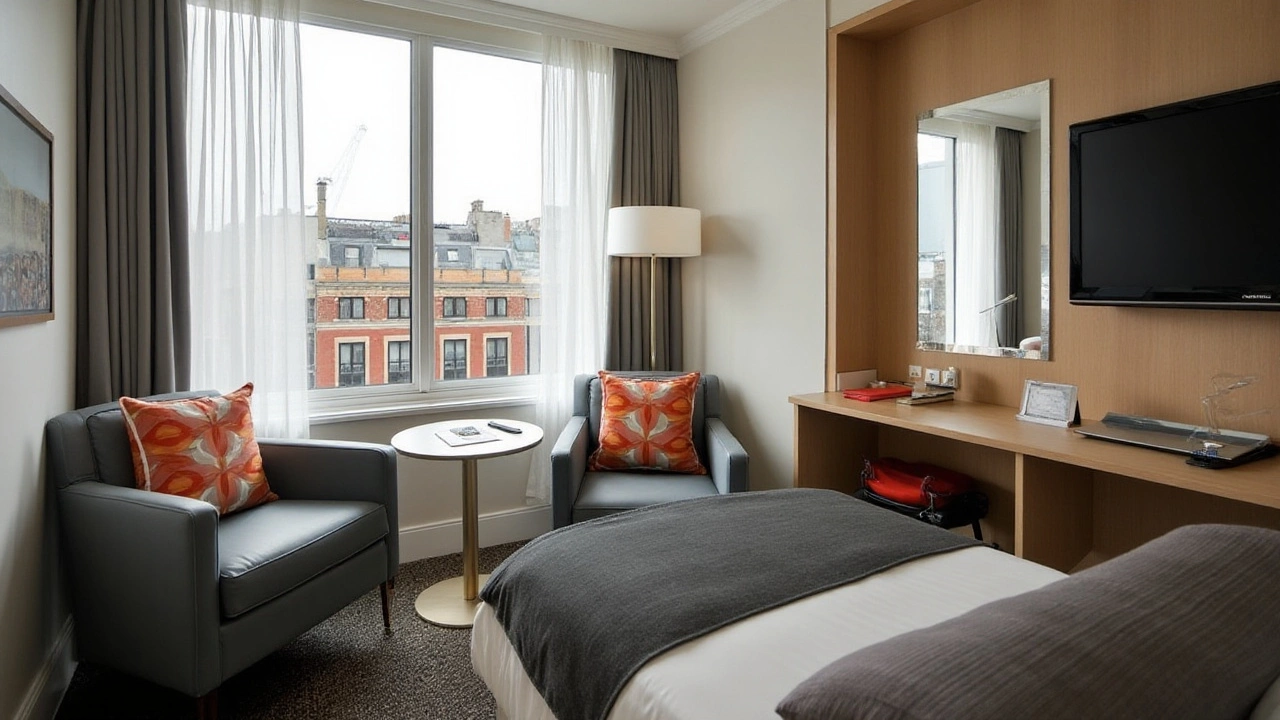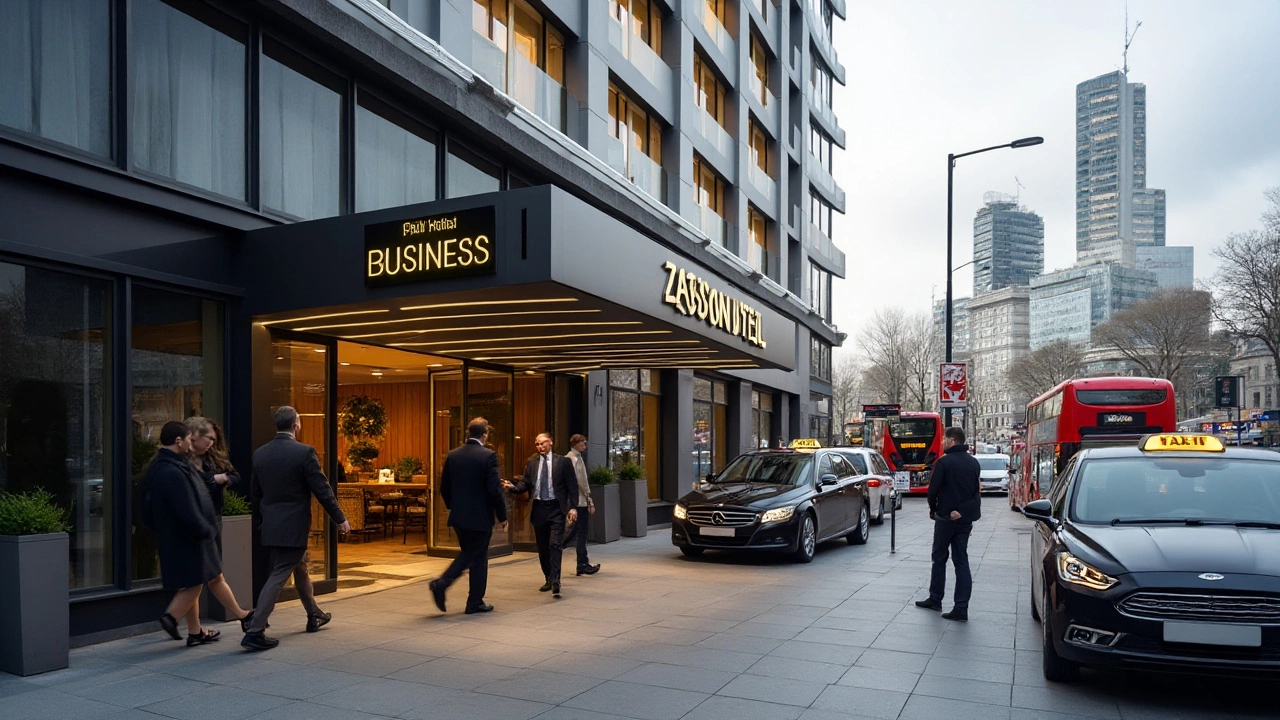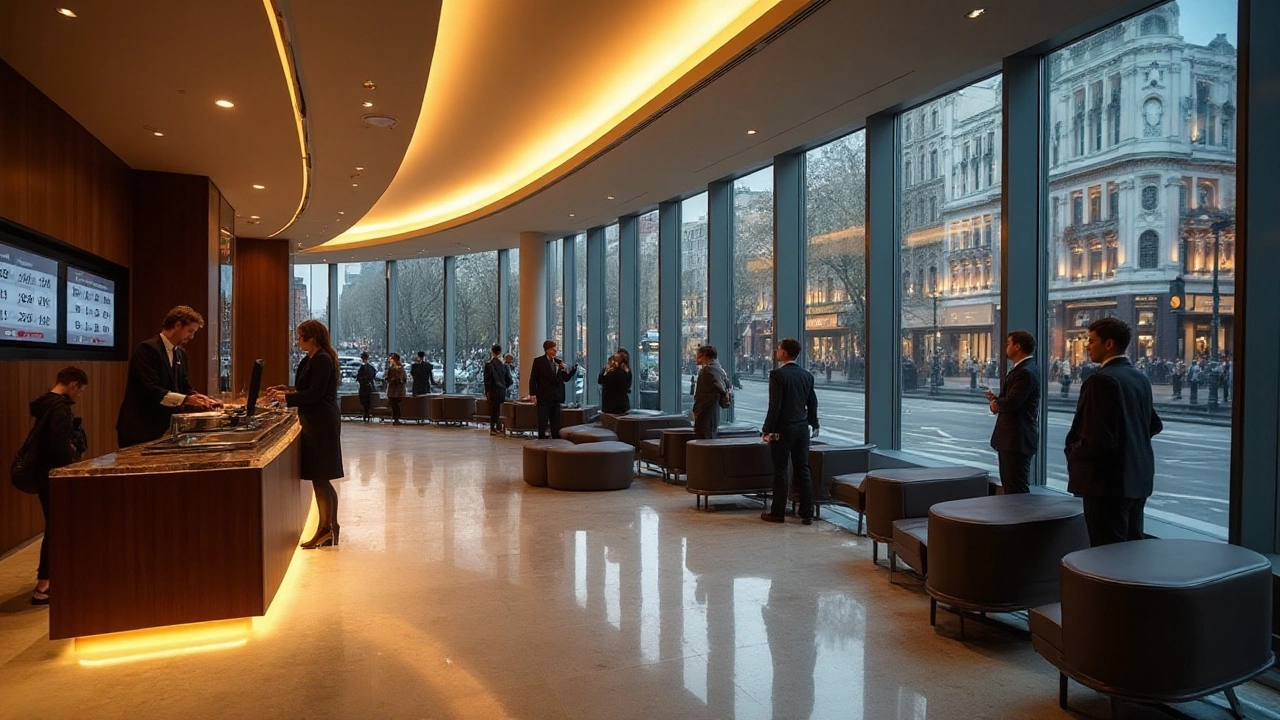Understanding the World of Commercial and Business Hotels
2 Nov, 2024In the world of hospitality, commercial or business hotels play a pivotal role in accommodating professionals on the go. These establishments have carved out a niche by focusing on the specific needs of business travelers. Not just a bed to sleep in, these hotels are a hub for productivity, networking, and relaxation after a long day of meetings.
Exploring one of these hotels, you quickly notice features tailored for work rather than leisure. Dedicated meeting rooms, high-speed internet access, and strategic locations near key business districts are just a few aspects that set them apart. If you’re someone who frequently travels for work, understanding what these hotels offer can transform a regular business trip into a seamless experience.
- Defining Commercial and Business Hotels
- Key Amenities and Features
- Choosing the Right Business Hotel
- Benefits of Staying in a Business Hotel
Defining Commercial and Business Hotels
When we talk about commercial hotels or business hotels, we refer to a specialized segment of the hospitality industry. These are not your typical vacation getaways; they are designed with a different purpose in mind. They cater specifically to the needs of professionals who are often away from home, flitting from one business engagement to another. The core idea of a business hotel is to offer a productive environment that aligns with the busy schedules and varied demands of business travelers. Here, convenience, efficiency, and accessibility are more than just buzzwords—they're essentials. From express check-in services to on-the-go breakfast options, these hotels understand the value of time for their clientele. Being situated in urban centers or near airports, they reduce commute times, allowing guests to maximize their work hours and minimize travel fatigue.
The concept of the business hotel emerged alongside the rapid globalization of the workforce. As companies expanded internationally, the need for suitable accommodations grew. Modern business hotels offer amenities such as reliable high-speed internet, dedicated conference rooms equipped with the latest presentation technology, and even co-working spaces. These amenities are not merely add-ons but considered integral parts of the offering. For instance, the Sheraton Hotels & Resorts highlighted in a report that 70% of business travelers prioritize the availability of meeting rooms when choosing a hotel. Here's where business hotels shine, as they blend traditional hospitality with corporate functionality. They enhance the travel experience by reducing the friction that often comes with business trips, like impractical check-out times or lack of workspace in rooms.
Distinction lies not only in the services but also in the ambiance. These hotels exude a professional aura with sleek, modern designs, understated yet comfortable furnishings, and abundant meeting spaces. This environment instills a sense of focus and professionalism the moment you check in. Additionally, they often provide specific programs aimed at business travelers, such as loyalty points that translate into business perks or discounts for repeat stays. US News Travel notes, "Loyalty in business travel can significantly cut down on costs, providing better deals and upgrading experiences for regular patrons." Another critical aspect of these hotels is their culinary offerings; many business travelers require meals outside of the typical restaurant hours, which is why 24-hour room service or on-site cafes that open early and close late have become staples.
While focusing on the needs of the business sector, these hotels also ensure relaxation isn't overlooked. Many feature amenities like gyms, swimming pools, and relaxing lounges where guests can unwind after a hectic schedule. This dual functionality can often lead to a productivity boost for business travelers who know that downtime is just as valuable as work time. The existence of spas and rejuvenation centers within many business hotels offers a unique balance between work and leisure, ensuring guests are refreshed and ready for their next endeavor. It is this thoughtful design—where every aspect of a business traveler's journey is considered—that truly defines the essence of business hotels. Within this niche, they continue to evolve, always striving to exceed the expectations of their clients and setting a benchmark for the modern hospitality industry.

Key Amenities and Features
Business travelers need much more than just a comfortable bed and a mini-bar. They require an effective blend of work-friendly features and comforting facilities designed to make their stay seamless and productive. The primary element that sets commercial hotels apart is their exceptional focus on practical amenities that cater specifically to the itinerant executive.
A standout feature in these hotels is the conference facilities they offer. Ranging from large auditoriums that can host dozens of participants to intimate meeting spaces for one-on-one discussions, these venues are equipped with the latest technology. Video conferencing tools, projection systems, and soundproofing are standard, enabling smooth, professional events at a moment’s notice. Accompanying these facilities are business centers, often open 24/7. These centers provide everything from high-speed internet access to printing, faxing, and other essential office services, so guests can manage their business obligations as if they were in their own office. Free Wi-Fi is a given, but what really shines is the uninterrupted high-speed access, catering to the needs of tech-savvy guests who might need to run several devices at once.
On the stats side, a study by the Hotel Investment Advisor Group noted that business travelers prioritize these tech amenities, with 78% stating fast, reliable internet as a key reason for choosing a hotel.
"In the competitive world of business accommodations, seamless connectivity is not just expected; it's essential," stated an expert in the field, highlighting the pressure on hotels to deliver systems that rival even the most modern offices.Accessibility is another area where business hotels excel. Their locations are typically near major business districts, airports, and transportation hubs, providing easy access to the heart of the city's action, thus reducing time spent commuting. This strategic positioning offers a great benefit to executives who need to move quickly between meetings and appointments.
Dining isn't left behind; the in-house restaurants often outperform expectations with gourmet cuisines that cater to international tastes, accommodating global executives and their varied palates. Room service is efficient and prompt, understanding the time constraints of the working guest and ensuring both quality and speed. Fitness centers and spas are key perks that help travelers combat jet lag and stress, essential for those looking to maintain their wellbeing on the go. Modern business hotels recognize that productivity is closely linked to wellness, offering these facilities as a reprieve between meetings, enabling guests to refresh both body and mind.
In conclusion, these hotels are not just places to stay but have been transformed into comprehensive business hubs. They cater to every possible need a business traveler may have, ensuring that from the moment of check-in to check-out, every experience is crafted to encourage efficiency, effectiveness, and ease. Through their well-thought features and facilities, business hotels ensure that their guests can focus entirely on their work without the distractions typically involved in travel.

Choosing the Right Business Hotel
Picking a business hotel can sometimes feel like navigating a maze, especially with so many options available nowadays. It's important to consider what's most important for a productive stay. The location of the hotel is often a top priority. Being close to the city center or your meeting venue means you spend less time commuting and more time on what matters. A hotel situated near essential amenities like restaurants, conference centers, and public transport can make all the difference. You’ll want a place where you can easily grab a meal after a late-night meeting or catch a cab to the airport without hassle.
Another key aspect is the technological amenities offered by the commercial hotel. High-speed internet is no longer a perk but a necessity. Check if the hotel provides complimentary wifi and if it extends to your room, the lobby, and any onsite meeting areas. Some hotels also offer business centers equipped with computers, printers, and fax machines, which can be invaluable if you’re preparing for an important presentation or need to print out documents on the fly. According to a survey conducted by the Global Business Travel Association, travelers rank free wifi access as their top priority when booking accommodation, underscoring its importance in today's digital age.
Price is another influencing factor, but it’s essential not to view it in isolation. Consider what’s included in the cost of the room. Many business hotels offer breakfast or access to a gym in their room rate, which can save you money in the long term. If you’re going to be staying for a few days or are a frequent visitor to the area, it might also be worth checking if the hotel offers a loyalty program. Over time, these programs can lead to significant savings and can sometimes include perks like room upgrades or late checkout options. As noted by travel expert Samantha Brown, "A good business hotel balances functionality with comfort, turning work trips into enjoyable journeys."
The culture and ambiance of a hotel can also contribute to your stay. Opting for a place where the staff is friendly and responsive to requests might seem trivial but can greatly impact your stay. Whether it’s arranging a last-minute shuttle to the airport or providing recommendations for a client dinner, attentive service can ease many of the stresses associated with business travel. Plus, some hotels go beyond by offering networking events or social hours, providing opportunities to mingle with other business travelers, potentially leading to new connections.
Finally, safety should never be overlooked. Ensure the hotel offers features like secure parking, 24-hour front desk service, and in-room safes. Safety tends to be top of mind for solo travelers, and rightly so. Look for reviews online or ask previous visitors for their feedback about how safe they felt during their stay. It’s worth remembering that a secure environment contributes to peace of mind, which is crucial when focusing on work-related tasks. In this regard, the more information you have upfront about what to expect, the better your decision will align with your personal and professional needs.

Benefits of Staying in a Business Hotel
Choosing to stay in a business hotel during your work trips can significantly enhance your travel experience. These hotels are designed with the professional in mind, which means they come equipped with numerous amenities to help you manage your business affairs more effectively. The ambiance is crafted to help you focus and boost productivity, thanks to facilities like state-of-the-art conference rooms, business centers, and yes, even those often-coveted in-room desks.
One major benefit of commercial hotels is their strategic locations. Typically positioned in the heart of business districts or near major conference centers, these hotels provide easy access to key areas you might need to venture during a business trip. This saves time, reduces commuting hassles, and often offers a chance to enjoy the local culture close by—an advantageous blend of work and pleasure. As American hotelier Willard Marriott once said,
‘Good hospitality is always about meeting the needs and expectations of your guests. It's more than just providing a service; it's about building an environment where guests can thrive.’
Another significant advantage is the plethora of services offered. Unlike leisure hotels, a business hotel might provide advanced technological services, like reliable high-speed internet and multiple charging points, which are practically indispensable for staying connected and productive. Moreover, some hotels offer a dedicated business concierge to assist with specific requests or logistical needs, making it easier for you to meet critical deadlines without any hassle.
Relaxation is crucial, even when on a business trip. Most business hotels ensure that relaxation isn't overlooked by providing wellness and fitness facilities. After a day packed with meetings, there's nothing better than unwinding in a well-equipped gym or spa. Recent studies in travel trends indicate that over 70% of business travelers seek out hotels with these amenities, finding them crucial for maintaining work-life balance. Maintaining your usual routine while on the road can lead to a more satisfying and less stressful travel experience.
Finally, there’s the aspect of networking opportunities. Business hotels often host events and gatherings, creating unique opportunities for networking with other guests who might be in town for similar reasons. From business luncheons to cocktail hours, these informal settings allow you to mingle, potentially leading to valuable professional connections. With so many advantages, opting for a commercial hotel during your next business trip makes a lot of sense—helping you handle your work while also offering a comfortable and enriching environment to enjoy.
| Feature | Benefit |
|---|---|
| High-Speed Internet | Enables swift communication and data exchange |
| Conference Rooms | Provides professional settings for meetings |
| Proximity to Business Centers | Reduces travel time, enhances convenience |
| Wellness Facilities | Ensures relaxation and work-life balance |

 by
by